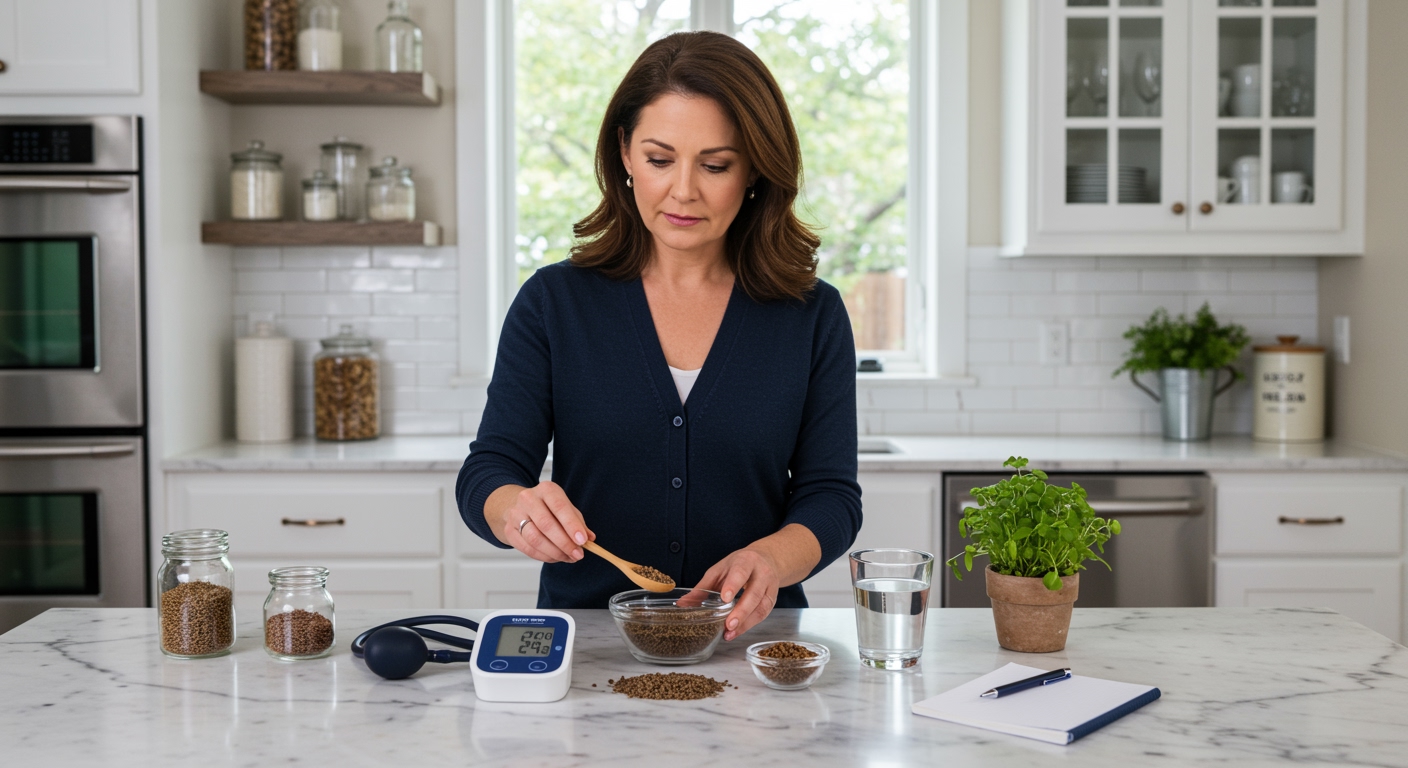✪ Key Takeaway: Hypotension patients should use caraway seeds cautiously as they may further lower blood pressure levels.
Introduction
Your morning tea smells amazing with that pinch of caraway seeds you just added.
But if you have low blood pressure, you might be wondering whether this aromatic spice could make your condition worse.
Hi, I’m Abdur, your nutrition coach and today I’m going to explain exactly how caraway seeds affect blood pressure and whether hypotension patients need to worry about them.
What Are Caraway Seeds And How Do They Work?
Caraway seeds come from the Carum carvi plant and have been used for centuries in cooking and traditional medicine.
These small, crescent-shaped seeds contain powerful bioactive compounds including carvone, limonene, and various flavonoids.
Research shows that caraway seeds have vasodilatory properties, which means they can help relax blood vessel walls.
When blood vessels relax, they become wider and allow blood to flow more easily.
This mechanism naturally leads to reduced blood pressure because your heart does not need to pump as hard to circulate blood throughout your body.
The seeds also contain potassium, a mineral that helps balance sodium levels and supports healthy blood pressure regulation.
✪ Fact: Just one teaspoon of caraway seeds provides about 28 milligrams of potassium.
Do Caraway Seeds Lower Blood Pressure?
Yes, caraway seeds can lower blood pressure through multiple mechanisms in your cardiovascular system.
Studies have shown that regular consumption of caraway seeds can lead to significant reductions in both systolic and diastolic blood pressure readings.
The primary mechanism involves the calcium channel blocking effect of compounds found in caraway seeds.
Calcium channels in your blood vessel walls control how much calcium enters the smooth muscle cells.
When these channels are blocked, less calcium enters the cells, causing the muscles to relax and blood vessels to widen.
Additionally, caraway seeds contain compounds that may influence the renin-angiotensin system, which plays a crucial role in blood pressure regulation.
This system controls blood volume and vessel conStriction, and when influenced by caraway compounds, it tends to promote lower blood pressure levels.
✪ Pro Tip: The blood pressure lowering effects typically appear within 2-4 hours of consuming caraway seeds.
Should Hypotension Patients Avoid Caraway Seeds?
Hypotension patients should exercise significant caution when consuming caraway seeds, especially in large amounts.
If your blood pressure is already below 90/60 mmHg, adding caraway seeds to your diet could potentially make your condition worse.
The additive effect of caraway seeds on already low blood pressure can lead to symptoms like dizziness, fainting, fatigue, and difficulty concentrating.
However, complete avoidance may not be necessary for everyone with hypotension.
Small amounts used occasionally for flavoring purposes are generally considered safe for most people with mild hypotension.
The key is understanding your individual response and monitoring how your body reacts to different amounts.
Always consult with your healthcare provider before making significant changes to your diet, especially if you take blood pressure medications or have severe hypotension.
✪ Note: Severe hypotension patients should avoid therapeutic doses of caraway seeds entirely.
What Amount Is Safe For Low Blood Pressure?
For people with mild hypotension, limiting caraway seeds to half a teaspoon daily is generally considered safe.
This amount provides flavor benefits without delivering enough active compounds to significantly impact blood pressure levels.
Avoid consuming caraway seed supplements or extracts if you have any form of hypotension, as these concentrated forms contain much higher levels of active compounds.
When using caraway seeds in cooking, spread the consumption throughout the day rather than consuming large amounts at once.
Monitor your blood pressure regularly if you choose to include caraway seeds in your diet, especially during the first few weeks.
Pay attention to symptoms like increased dizziness, weakness, or feeling faint after consuming foods containing caraway seeds.
If you experience any concerning symptoms, discontinue use immediately and consult your healthcare provider.
✪ Pro Tip: Start with just a pinch of caraway seeds and gradually assessyour body’s response over several days.
Are There Better Spice Alternatives?
Yes, several spices provide similar flavor profiles without the blood pressure lowering effects of caraway seeds.
Fennel seeds offer a similar licorice-like taste but have neutral effects on blood pressure for most people.
Cumin seeds provide an earthy, warm flavor that complements many dishes without significantly affecting cardiovascular function.
Dill seeds have a fresh, tangy taste that works well in breads, pickles, and savory dishes.
For people with hypotension, these alternatives allow you to enjoy complex flavors without worrying about further lowering your blood pressure.
You can also consider using herbs like thyme or oregano, which provide robust flavors and may even have mild blood pressure supporting properties.
Experiment with different combinations to find flavors that satisfy your taste preferences while supporting your cardiovascular health goals.
✪ Fact: Ginger and black pepper can actually help support healthy blood pressure levels in hypotension patients.
The Bottom Line
Hypotension patients should approach caraway seeds with caution due to their proven blood pressure lowering effects.
Small amounts for flavoring are generally safe, but therapeutic doses should be avoided entirely.
I would love to hear about your experiences with spices and blood pressure management, so please share your questions or feedback in the comments below.
References
At NutritionCrown, we use quality and credible sources to ensure our content is accurate and trustworthy. Below are the sources referenced in creating this article:





